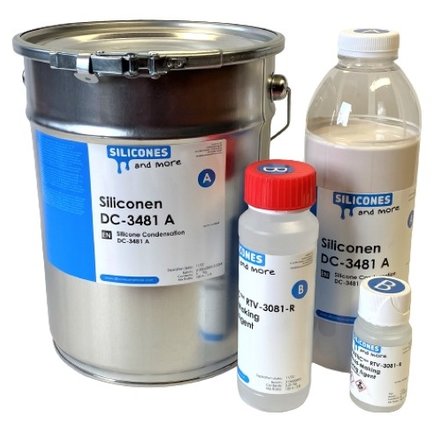Condensation Curing Silicone rubber
Condensation-curing silicones are commonly used in various applications. They cure through a reaction with tin salts. These silicones offer several advantages, such as flexibility and cost-effectiveness.
B 5 - B component for Silicone Condensation 5, 20 and 35 universal
€ 4,78 € 3,95 Excl. tax
✔ Low dosage (5%)
Compare
✔ Low shrinkage (< 0.3 %)
✔ Mixing ratio (Weight) 100:5
✔ Works on most condensation curing siliconesSilicone Condensation 20 A component
€ 18,- € 14,88 Excl. tax
✔ Flexible, Strong, Universal
Compare
✔ White, Good Fluid, Bleeding
✔ Shore (A) 23 ~ 26
✔ Low shrinkage (<0.3%)
✔ 20 minutes working time
✔ Mix ratio (Weight) 100:5

Condensation Silicones: Durable, User-Friendly, and Cost-Saving
PLEASE NOTE: these silicones may only be purchased by companies that can handle the hardener for these silicones. These silicones may no longer be purchased by private individuals.
Condensation-curing silicones, also known as tin silicones, are widely used materials in various applications. They cure through a reaction with tin salts. In this text, we discuss why condensation silicones are so popular and how to utilize them optimally.
1. User-Friendliness
Condensation silicones are easy to process. Depending on the application, they can be poured, brushed, or injected, making them suitable for both small and large projects.
2. Durability
These silicones have a long lifespan and are resistant to extreme temperatures, chemicals, and weather conditions. They maintain their properties over an extended period, which is essential for reliable performance.
3. Curing Speed
The curing speed of condensation silicones depends on humidity and temperature. An ideal temperature range is between 15°C and 30°C, with a desired humidity level of over 30%. Note that at temperatures above 60°C, the silicones may no longer cure.
4. Detail Accuracy and Shrinkage
Condensation silicones capture even the smallest details, but be aware that they may shrink over time.
5. Temperature Resistance
In their cured form, condensation silicones can withstand temperatures from -20°C to +180°C.
6. Suitability for Castings
Important: Not all condensation silicones are suitable for casting resins such as epoxy, clear PU, or polyester. Use specially designed condensation silicones, such as Type 3481 R, for these applications.
Key Consideration: As a company, it’s crucial to be familiar with the curing agents associated with this type of silicone. This ensures optimal curing and performance.


